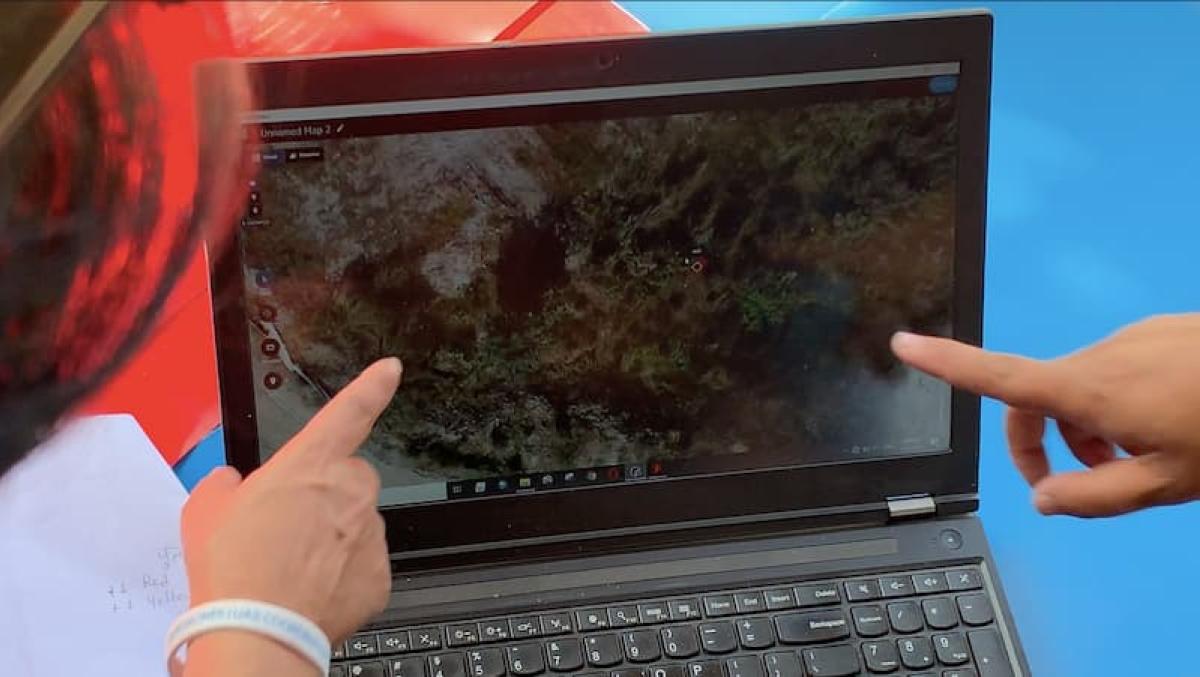
Finding New Ways of Turning Drone Data into Action
April 13th, 2021

As part of our contribution to the enabling environment necessary for Flying Labs to thrive in their mission, we recently launched a new program called “Turning (Drone) Data into Action.” The program aims to equip Flying Labs with the tools and techniques they need to facilitate and enable their stakeholders’ ability to read and use drone data. Data is a substantial part of our work, including providing local decision-makers and actors with data products and analysis based on acquired drone data.
However, sharing data with stakeholders does not mean that action will be taken. This next part of the process is often out of the Flying Labs’ hands. Once they’ve delivered the data to their partner, the Flying Labs’ part of the job is done. However, from our experience, providing a final data product or analysis is rarely enough to help stakeholders maximize its value. Instead, including them in critical parts of the process helps them better understand how to turn that data into action and positive impact.

The program consists of a checklist and handbook with a step-by-step approach. These two elements are supported by several workflows and practical tools fully adapted to Flying Labs’ data projects, which have been co-created by WeRobotics with the close collaboration of Flying Labs, and then tested by Tanzania Flying Labs for practical implementation.
We now want to test the program further by determining with Flying Labs which elements are useful (and how), what’s missing, and which parts are not applicable. With this input, we will update and expand the existing resources and share Flying Labs’ initial learnings with the network.
Our newest round of Flying Labs Microgrants will allow us to do just that. WeRobotics’ Microgrants Program provides Flying Labs with grants to support a wide range of topics and situations (for example, the 2020 microgrant round on COVID-19 response), opportunities to support R&D and innovation, or specific challenges faced by Flying Labs (for example, the 2019 microgrant round on barriers faced by Flying Labs to scaling their work). Through these microgrants, we aim at co-financing small projects and initiatives that would not be initiated without such initial funding and allow Flying Labs to pursue projects they are passionate about.
We have received 14 strong proposals for this round of "Turning Data into Action" microgrants. Based on predefined criteria, six Flying Labs—Benin, Kenya, Namibia, Papua New Guinea, Zambia, and Zimbabwe—have each received a grant of US $5,000 to implement their data project using the tools and resources provided by the Turning Data into Action program. They will document their experiences and share them in a joint session later this summer with the internal project team and the whole network.
In an ideal world, data collected by Flying Labs leads to perfect situational awareness by the project’s stakeholders, which results in action and positive impact. The program’s goal is to bring Flying Labs closer to this ideal scenario, and the microgrants will undoubtedly propel us in the right direction.
We thank the Hewlett Foundation for supporting us in this program and for the microgrants awarded to five African Flying Labs.
Recent Articles

